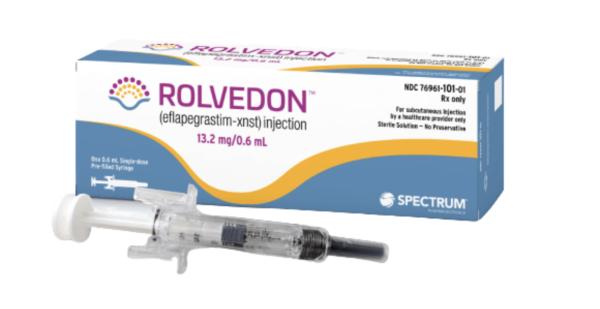Eflapegrastim
Generic name: eflapegrastim [ EF-la-PEG-ra-stim ]
Brand name: Rolvedon
Dosage form: subcutaneous solution (xnst 13.2 mg/0.6 mL)
Drug class: Colony stimulating factors
What is eflapegrastim?
Eflapegrastim is used in adults to treat neutropenia, a lack of certain white blood cells caused by cancer, chemotherapy, or by other conditions.
Eflapegrastim is used in adults to treat neutropenia, a lack of certain white blood cells caused by cancer, bone marrow transplant, receiving chemotherapy, or by other conditions.
Eflapegrastim may also be used for purposes not listed in this medication guide.
Eflapegrastim side effects
Get emergency medical help if you have signs of an allergic reaction: hives; difficult breathing; swelling of your face, lips, tongue, or throat.
Eflapegrastim can cause your spleen to become enlarged and it could rupture (tear). Call your doctor right away if you have sudden or severe pain in your left upper stomach spreading up to your shoulder.
Capillary leak syndrome is a rare but serious side effect. Call your doctor right away if you have signs of this condition: stuffy or runny nose followed by tiredness, thirst, decreased urination, trouble breathing, and sudden swelling or weight gain.
Eflapegrastim may cause serious side effects. Call your doctor at once if you have:
-
shortness of breath or rapid breathing;
-
pain or trouble breathing;
-
easy bruising, unusual bleeding, purple or red spots under your skin;
-
abdominal pain, tiredness, back pain;
-
signs of infection-- fever, chills, sore throat, body aches, unusual tiredness, loss of appetite; or
-
kidney problems--little or no urinating, blood in your urine, swelling in your face or ankles.
Common side effects of eflapegrastim may include:
-
bone, muscle, or joint pain;
-
back pain;
-
tiredness;
-
rash;
-
fever; or
-
pale skin, feeling light-headed or short of breath, cold hands and feet.
This is not a complete list of side effects and others may occur. Call your doctor for medical advice about side effects. You may report side effects to FDA at 1-800-FDA-1088.
Related/similar drugs
Warnings
Eflapegrastim can cause your spleen to become enlarged and it could rupture (tear). Call your doctor right away if you have sudden or severe pain in your left upper stomach spreading up to your shoulder.
Before taking this medicine
You should not use eflapegrastim if you are allergic to eflapegrastim, filgrastim, or pegeflapegrastim.
Tell your doctor if you have ever had:
-
sickle cell disorder; or
-
kidney disease.
Tell your doctor if you are pregnant or breastfeeding.
How is eflapegrastim given?
Follow all directions on your prescription label and read all medication guides or instruction sheets. Use the medicine exactly as directed.
Eflapegrastim is injected under the skin by a healthcare provider.
You will receive 1 injection of eflapegrastim for each cycle of chemotherapy. You should not receive this medicine for 14 days before or within 24 hours after your dose of chemotherapy.
You will need frequent medical tests.
Eflapegrastim dosing information
Usual Adult Dose for Neutropenia Associated with Chemotherapy:
Usual dose: 13.2 mg subcutaneously once per chemotherapy cycle
Comments:
-Dose should be given at least 24 hours after cytotoxic chemotherapy.
-This drug should not be administered within the period from 14 days before to 24 hours after administration of cytotoxic chemotherapy.
-This drug is not indicated for the mobilization of peripheral blood progenitor cells for hematopoietic stem cell transplantation.
Use: To decrease the incidence of infection, manifested by febrile neutropenia, in patients with non-myeloid malignancies receiving myelosuppressive anti-cancer drugs associated with a significant incidence of neutropenia and fever.
What happens if I miss a dose?
Call your doctor for instructions if you miss an appointment for your eflapegrastim injection.
What happens if I overdose?
Seek emergency medical attention or call the Poison Help line at 1-800-222-1222.
What should I avoid while receiving eflapegrastim?
Avoid being near people who are sick or have infections. Tell your doctor at once if you develop signs of infection.
What other drugs will affect eflapegrastim?
Other drugs may affect eflapegrastim, including prescription and over-the-counter medicines, vitamins, and herbal products. Tell your doctor about all other medicines you use.
Eflapegrastim Biosimilars
Biosimilar and interchangeable products are biological products that are highly similar to and have no clinically meaningful differences from the reference product.
Reference products
These are biological products that have already been approved by the FDA, against which biosimilar products are compared. There is 1 for eflapegrastim.
Rolvedon (eflapegrastim-xnst) - Spectrum Pharmaceuticals, Inc.
| Formulation type | Strength |
|---|---|
| Pre-Filled Syringe | 13.2 mg/0.6 mL |
View Rolvedon information in detail.
More about eflapegrastim
- Check interactions
- Compare alternatives
- Reviews (2)
- Side effects
- Dosage information
- During pregnancy
- Drug class: colony stimulating factors
- En español
Patient resources
Other brands
Professional resources
Other brands
Related treatment guides
Further information
Remember, keep this and all other medicines out of the reach of children, never share your medicines with others, and use this medication only for the indication prescribed.
Always consult your healthcare provider to ensure the information displayed on this page applies to your personal circumstances.
Copyright 1996-2025 Cerner Multum, Inc. Version: 1.01.

